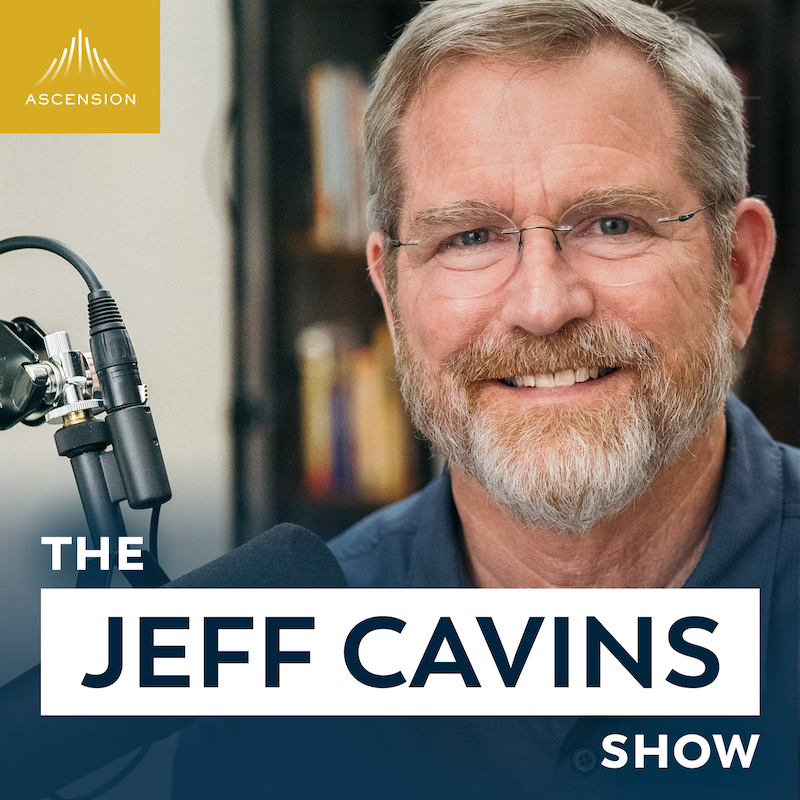Everyone who finds himself in a dilemma intuitively turns to God and makes promises whether they are empty or sincere. When we discover that we are fine, we often ignore our promises and may even come to blame God as the cause in the first place. Today, Jeff dives into Scripture and shares the prescribed way to give God thanks for all that he has given us, especially when he has helped us through a perilous time. Maybe you are going through a great trial right now and the last thing on your mind is Thanksgiving. Take 30 minutes to listen and discover the ultimate thanksgiving that has stood the test of time. Your holiday season may become a little bit brighter.
Snippet from the Show:
We offer up thanksgiving to God in the Mass and celebrate the victory of our risen Lord. This victory is our victory as we are joined with him as his body. And every-time we enter into the Mass with a sense of plight, we should exit with praise and thanksgiving in our hearts and on our lips.
SHOWNOTES
In the Old Testament, there were several kinds of sacrifices, such as burnt offerings and grain offerings, which were performed for specific reasons. The one with which we are most familiar is the Passover sacrifice, but there was another offering—called the todah offering—that was very significant. The Hebrew word todah means thanksgiving, and this word is used in modern Hebrew today to say “thank you.”
The Book of Leviticus describes the todah sacrifice in more detail. Notice how the offering is accompanied by unleavened bread, revealing the connection between the todah offering and the Eucharist.
And this is the law of the sacrifice of peace offerings which one may offer to the LORD. If he offers it for a thanksgiving, then he shall offer with the thank offering unleavened cakes mixed with oil, unleavened wafers spread with oil, and cakes of fine flour well mixed with oil. With the sacrifice of his peace offerings for thanksgiving he shall bring his offering with cakes of leavened bread. And of such he shall offer one cake from each offering, as an offering to the LORD; it shall belong to the priest who throws the blood of the peace offerings. And the flesh of the sacrifice of his peace offerings for thanksgiving shall be eaten on the day of his offering; he shall not leave any of it until the morning. (Leviticus 7:11–15)
The todah is a subcategory of the peace offering mentioned in Leviticus As we will see by the example of Jonah, the todah sacrifice was a thank offering from someone whose life had been saved from great danger, such as war or a natural disaster. Sonny should have made this kind of offering after he was saved from the ocean!
Jonah, who found himself in what looked like a fatal situation in the belly of the whale, committed to offer a todah offering in the Temple if he survived. Jonah promised God that he would pay his vow if God saved him.
But I with the voice of thanksgiving will sacrifice to thee; what I have vowed I will pay. Deliverance belongs to the LORD! (Jonah 2:9)
Details of the Todah Offering
What would a typical todah offering look like? First, a person would bring an animal, in Jonah’s case a lamb, to the Temple and present it to the priest, who would sacrifice it on the altar and then roast it. The Law of Moses commanded that the sacrifice be eaten on the same day as the offering was made, and so family and friends were invited to a meal in order that all of it was consumed. Along with the lamb, unleavened bread was presented to the Lord and eaten at the meal along with wine. Psalms of thanksgiving accompanied the meal in order to commemorate the occasion and show gratitude. Many psalms are considered to be psalms of thanksgiving, such as Psalm 22, 69, and 116.
And they brought the ark of God, and set it inside the tent which David had pitched for it; and they offered burnt offerings and peace offerings before God. And when David had finished offering the burnt offerings and the peace offerings, he blessed the people in the name of the LORD, and distributed to all Israel, both men and women, to each a loaf of bread, a portion of meat, and a cake of raisins. (1 Chronicles 16:1–3)
Moreover he appointed certain of the Levites as ministers before the ark of the LORD, to invoke, to thank, and to praise the LORD, the God of Israel. Asaph was the chief, and second to him were Zechariah, Je-iel, Shemiramoth, Jehiel, Mattithiah, Eliab, Benaiah, Obed-edom, and Je-iel, who were to play harps and lyres; Asaph was to sound the cymbals, and Benaiah and Jahaziel the priests were to blow trumpets continually, before the ark of the covenant of God. (1 Chronicles 16:4–6)
The Catechism says:
The Eucharist is a sacrifice of thanksgiving to the Father, a blessing by which the Church expresses her gratitude to God for all his benefits, for all that he has accomplished through creation, redemption, and sanctification. Eucharist means first of all ‘thanksgiving.’ (CCC, 1360)
Do you have comments or questions for Jeff? Use the comment box below, or email Jeff at thejeffcavinsshow@ascensionpress.com. You may hear your question or comment in an upcoming podcast episode!




